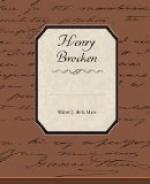They stayed at a little distance from us with dwelling eyes and parted lips. Then the fairer and, as it seemed to me, elder of the brothers stooped and plucked a few blades of grass and proffered them, half fearfully, to the beast that amazed him. But the other gave less heed to Rosinante, fixed the filmy lustre of his eyes on me, his wonderful young face veiled with that wisdom which is in all children, and of an immutable gravity.
But by this time, she who it seemed had the charge of these children had followed them with her eyes. To her then, leaving Rosinante in an ecstasy of timidity before such god-like boys, I addressed myself.
So might a traveller lost beneath strange stars address unanswering Night. She, however, raised a compassionate face to me and listened with happy seriousness as to a child returned in safety at evening from some foolhardy venture. Yet there seemed only a deeper youthfulness in her face for all its eternity of brooding on her beauteous children. Narrow leaves of olive formed her chaplet. The darker wine-colours of the sea changed in her eyes. There was no sense of gloom or sorrowfulness in her company. I began to see how the same still breast might bear celestial children so diverse as these, whose names, she told me presently, were Sleep and Death.
I looked at the two children at play, “Ah! now,” I said, almost involuntarily “the golden boy who has caught my horse’s bridle in his hand, is not he Sleep? and he who considers his brother’s boldness—that one is Death?”
She smiled with lovely vanity, and told me how strange of heart young children are. How they will alter and vary, never the same for long together, but led by indiscoverable caprices and obedient to some further will. She smiled and said how that sometimes, when the birds hush suddenly from song, Sleep would creep tenderly and sadly to her knees, and Death clasp her roguishly, as if in some secret with the beams of morning. So would they change, one to the likeness of the other. But Sleep was, perhaps, of the gentler disposition; a little obstinate and headstrong; at times, indeed, beyond all cajolery; yet very sweet of impulse and ardent to make amends. But Death’s caprices baffled even her. He seemed now so pitiless and unlovely of heart; and now, as if possessed, passionate and swift; and now would break away burning from her arms in an infinite tenderness.
But best she loved them when there came a transient peace to both; and looking upon them laid embraced in the shadow-casting moonbeam, not even she could undoubtingly touch the brow of each beneath their likened hair, and say this is the elder, and this the dreamless younger of the boys.
Seeing, too, my eyes cast upon the undecipherable letters of the tomb by which we sat, she told me how that once, near before dawn, she had awoke in the twilight to find their places empty where the children had lain at her side, and had sought on, at last to find them even here, weeping and quarrelling, and red with anger. Little by little, and with many tears, she had gleaned the cause of their quarrel—how that, like very children, they had run a race at cockcrow, and all these stones and the slender bones and ashes beneath to be the prize; and how that, running, both had come together to the goal set, and both had claimed the victory.




